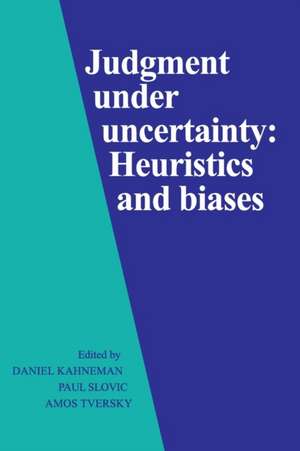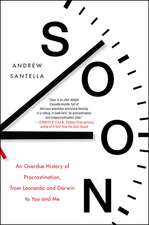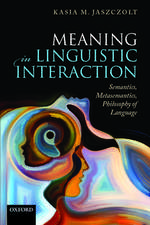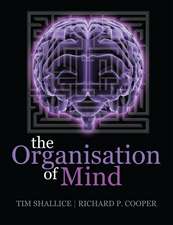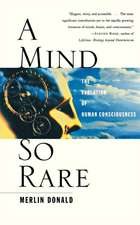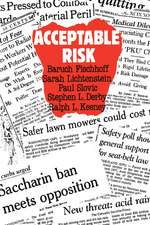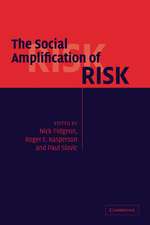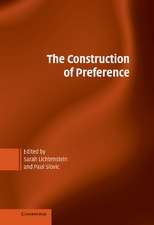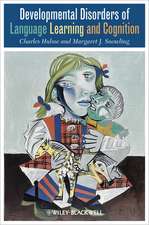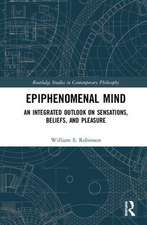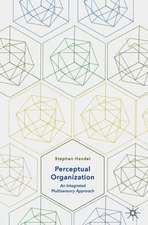Judgment under Uncertainty: Heuristics and Biases
Editat de Daniel Kahneman, Paul Slovic, Amos Tverskyen Limba Engleză Paperback – 29 apr 1982
Preț: 367.52 lei
Nou
Puncte Express: 551
Preț estimativ în valută:
70.32€ • 73.42$ • 58.20£
70.32€ • 73.42$ • 58.20£
Carte disponibilă
Livrare economică 14-28 martie
Livrare express 27 februarie-05 martie pentru 44.87 lei
Preluare comenzi: 021 569.72.76
Specificații
ISBN-13: 9780521284141
ISBN-10: 0521284147
Pagini: 544
Ilustrații: illustrations, bibliog , index
Dimensiuni: 149 x 228 x 28 mm
Greutate: 0.77 kg
Editura: Cambridge University Press
Colecția Cambridge University Press
Locul publicării:New York, United States
ISBN-10: 0521284147
Pagini: 544
Ilustrații: illustrations, bibliog , index
Dimensiuni: 149 x 228 x 28 mm
Greutate: 0.77 kg
Editura: Cambridge University Press
Colecția Cambridge University Press
Locul publicării:New York, United States
Public țintă
Academic/professional/technical: Research and professionalCuprins
Preface; Part I. Introduction: 1. Judgment under uncertainty: heuristics and biases Amos Tversky and Daniel Kahneman; Part II. Representativeness: 2. Belief in the law of small numbers Amos Tversky and Daniel Kahneman; 3. Subjective probability: a judgment of representativeness Daniel Kahneman and Amos Tversky; 4. On the psychology of presiction Daniel Kahneman and Amos Tversky; 5. Studies of representativeness Maya Bar-Hillel; 6. Judgments of and by representativeness Amos Tversky and Daniel Kahneman; Part III. Causality and Attribution: 7. Popular induction: information is not necessarily informative Richard E. Nisbett, Eugene Borgida, Rick Crandall and Harvey Reed; 8. Causal schemas in judgments under uncertainty Amos Tversky and Daniel Kahneman; 9. Shortcomings in the attribution process: on the origins and maintenance of erroneous social assessments Lee Ross and Craig A. Anderson; 10. Evidential impact of base rates Amos Tversky and Daniel Kahneman; Part IV. Availability: 11. Availability: a heuristic for judging frequency and probability Amos Tversky and Daniel Kahneman; 12. Egocentric biases in availability and attribution Michael Ross and Fiore Sicoly; 13. The availability bias in social perception and interaction Shelley E. Taylor; 14. The simulation heuristic Daniel Kahneman and Amos Tversky; Part V. Covariation and Control: 15. Informal covariation asssessment: data-based versus theory-based judgments Dennis L. Jennings, Teresa M. Amabile and Lee Ross; 16. The illusion of control Ellen J. Langer; 17. Test results are what you think they are Loren J. Chapman and Jean Chapman; 18. Probabilistic reasoning in clinical medicine: problems and opportunities David M. Eddy; 19. Learning from experience and suboptimal rules in decision making Hillel J. Einhorn; Part VI. Overconfidence: 20. Overconfidence in case-study judgments Stuart Oskamp; 21. A progress report on the training of probability assessors Marc Alpert and Howard Raiffa; 22. Calibration of probabilities: the state of the art to 1980 Sarah Lichtenstein, Baruch Fischhoff and Lawrence D. Phillips; 23. For those condemned to study the past: heuristics and biases in hindsight Baruch Fischhoff; Part VII. Multistage Evaluation: 24. Evaluation of compound probabilities in sequential choice John Cohen, E. I. Chesnick and D. Haran; 25. Conservatism in human information processing Ward Edwards; 26. The best-guess hypothesis in multistage inference Charles F. Gettys, Clinton Kelly III and Cameron R. Peterson; 27. Inferences of personal characteristics on the basis of information retrieved from one's memory Yaacov Trope; Part VIII. Corrective Procedures: 28. The robust beauty of improper linear models in decision making Robyn M. Dawes; 29. The vitality of mythical numbers Max Singer; 30. Intuitive prediction: biases and corrective procedures Daniel Kahneman and Amos Tversky; 31. Debiasing Baruch Fischhoff; 32. Improving inductive inference Richard E. Nesbett, David H. Krantz, Christopher Jepson and Geoffrey T. Fong; Part IX. Risk Perception: 33. Facts versus fears: understanding perceived risk Paul Slovic, Baruch Fischhoff and Sarah Lichtenstein; Part X. Postscript: 34. On the study of statistical intuitions Daniel Kahneman and Amos Tversky; 35. Variants of uncertainty Daniel Kahneman and Amos Tversky; References; Index.
Recenzii
"The papers chosen for this volume are an excellent collection, generally well-written and fascinating." Journal of Economic Literature
"The examples are lively, the style is engaging, and it is as entertaining as it is enlightening." Times Literary Supplement
"...an important and well-written book." Journal of the American Statistical Association
"...a good collection of papers on an important topic." Quarterly Journal of Experimental Psychology
"Clearly, this is an important book. Anyone who undertakes judgment and decision research should own it." Contemporary Psychology
"The examples are lively, the style is engaging, and it is as entertaining as it is enlightening." Times Literary Supplement
"...an important and well-written book." Journal of the American Statistical Association
"...a good collection of papers on an important topic." Quarterly Journal of Experimental Psychology
"Clearly, this is an important book. Anyone who undertakes judgment and decision research should own it." Contemporary Psychology
Descriere
The thirty-five chapters in this book describe various judgmental heuristics and the biases they produce, not only in laboratory experiments but in important social, medical, and political situations as well.
